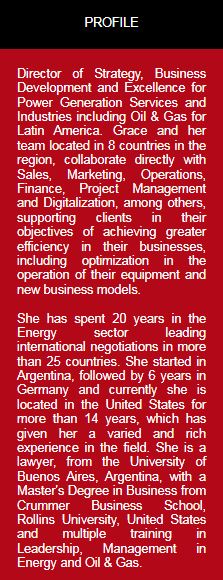Vesna Marinkovic U.
The Siemens Energy executive highlights the development of renewables; however, she acknowledges that it is not yet possible to make realistic forecasts in all sectors. She says that currently the stability, constant supply and flexibility of these energies continue to be a concern.
1We know that you have spent 20 years in the Energy business leading international negotiations in more than 25 countries. How does this success story begin?
Having started at a very young age as a bilingual secretary in the company, I began to study Law. After graduating from the University of Buenos Aires, I had the opportunity of working as an advisor in different areas of the company, so, during that process, there was a job opening to work as a Contract Manager within the company’s headquarters in Germany. That position involved learning the business of power generation, and negotiation. It was a real challenge for me and my family.
With immense support from my husband we were able to take on the challenge. The international experience has undoubtedly been the best decision we have made; It has allowed us to grow professionally and personally.
Getting ready for that job was a supreme effort, since it involved going through negotiations and getting to know different cultures; but in the end, it was worth it: one piece of advice that I usually give is that if you have family support, the rest could be learned, you become adaptable; the whole experience is priceless.
2Do you think that being a woman has been an obstacle to carrying out certain tasks in the business world?
There are countries that have a more open culture, but I recognize that there are others that are much more difficult in terms of communication and expressions that can sometimes be uncomfortable. Throughout my career, the negotiating tables were made up of men; it is not very common to cross paths with women in this industry.
Fortunately, there are programs focused on gender diversity within the corporate world, as well as support for female leadership to achieve a more diverse balance within work teams, but it is still challenging to achieve further progress in this industry. The choice of a technical career among young women may still be a cultural limitation that should be addressed.


3Which are the countries of the region with the best prospects in terms of negotiations in the field of Oil&Gas, energy, and why?
The best prospects are in those countries in which their governments create a development plan and then support investments with a regulatory framework and financing. In Latin America there are many countries such as Brazil, Mexico, Argentina, Peru, Colombia, Ecuador, Bolivia and Guyana with interesting developments in Oil & Gas, not exclusively, but with a remarkable performance during the last 10 years. On the other hand, there are other countries like Venezuela, that have been in the industry for many years. Negotiations in one country or another become more complex depending on their local challenges, and depending on delicate social and political circumstances.
4Is Bolivia a good market for equipment and technology in the energy sector?
Absolutely. Bolivia, like other countries in the region, has great growth potential. Its development is constant, and in recent years, it has been making exhaustive use of its resources, with clear objectives, thus achieving stability in energy matters. It has been increasing and modernizing its equipment technology, having a positive impact in the industrial sector.
5Have the pandemic and/or the internal regulations of each of the countries in the region had a greater impact in the world of power generation?
The pandemic has filled us with wisdom; has left us a legacy: remote working, and the energy sector has not been immune to this new reality. Digitalization in communication has had an undeniable impact, and many clients understood the need for “data”, how to use it and its great advantages; as well as the importance of how to manage your equipment from anywhere regardless of the distance and make decisions based on that data. During the pandemic, countless tasks were carried out remotely, and today many of these services have been optimized to continue being provided remotely but considerably effective with much higher results.
6Is the business world trend aiming towards the world of technology for renewables?
Renewable technology has greatly helped in its expansion and development, but we still have a long way to go before we can make a realistic forecast in all sectors. Today, stability, constant supply and flexibility continues to be a concern with renewables, and although we already have technology advances in battery energy storage, they still do not turn out to be completely viable solutions until the concern about the introduction of waste that is difficult and expensive to treat is eliminated.
At the same time, other solutions appear, such as green hydrogen-based e-fuels. This technology looks very promising with projects in our region such as the Haru Oni plant in Chile. In order to achieve technological and sustainable changes more quickly, it is essential to support the governments of each country with the promulgation of laws and regulations that promote the energy transition and innovation.

